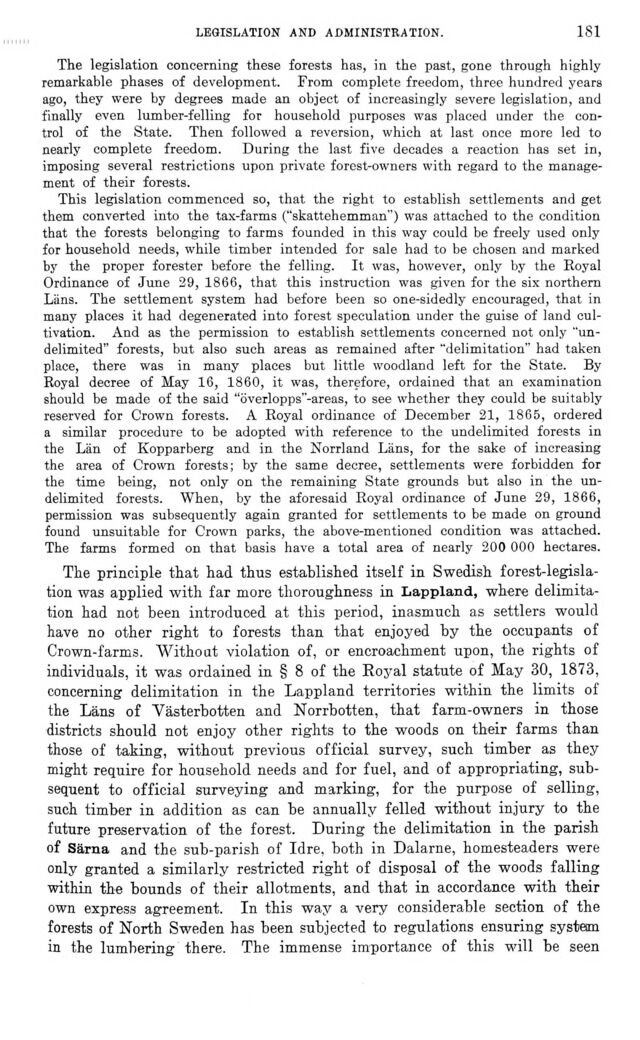
Full resolution (JPEG) - On this page / på denna sida - IV. Forestry - 1. Forests. By Th. Örtenblad

<< prev. page << föreg. sida << >> nästa sida >> next page >>
Below is the raw OCR text
from the above scanned image.
Do you see an error? Proofread the page now!
Här nedan syns maskintolkade texten från faksimilbilden ovan.
Ser du något fel? Korrekturläs sidan nu!
This page has never been proofread. / Denna sida har aldrig korrekturlästs.
legislation and administration.
181
The legislation concerning these forests has, in the past, gone through highly
remarkable phases of development. From complete freedom, three hundred years
ago, they were by degrees made an object of increasingly severe legislation, and
finally even lumber-felling for household purposes was placed under the
control of the State. Then followed a reversion, which at last once more led to
nearly complete freedom. During the last five decades a reaction has set in,
imposing several restrictions upon private forest-owners with regard to the
management of their forests.
This legislation commenced so, that the right to establish settlements and get
them converted into the tax-farms ("skattehemman") was attached to the condition
that the forests belonging to farms founded in this way could be freely used only
for household needs, while timber intended for sale had to be chosen and marked
by the proper forester before the felling. It was, however, only by the Royal
Ordinance of June 29, 1866, that this instruction was given for the six northern
Läns. The settlement system had before been so one-sidedly encouraged, that in
many places it had degenerated into forest speculation under the guise of land
cultivation. And as the permission to establish settlements concerned not only
"un-delimited" forests, but also such areas as remained after "delimitation" had taken
place, there was in many places but little woodland left for the State. By
Royal decree of May 16, 1860, it was, therefore, ordained that an examination
should be made of the said "överlopps"-areas, to see whether they could be suitably
reserved for Crown forests. A Royal ordinance of December 21, 1865, ordered
a similar procedure to be adopted with reference to the undelimited forests in
the Län of Kopparberg and in the Norrland Läns, for the sake of increasing
the area of Crown forests; by the same decree, settlements were forbidden for
the time being, not only on the remaining State grounds but also in the
undelimited forests. When, by the aforesaid Royal ordinance of June 29, 1866,
permission was subsequently again granted for settlements to be made on ground
found unsuitable for Crown parks, the above-mentioned condition was attached.
The farms formed on that basis have a total area of nearly 200 000 hectares.
The principle that had thus established itself in Swedish
forest-legisla-tion was applied with far more thoroughness in Lappland, where
delimitation had not been introduced at this period, inasmuch as settlers would
have no other right to forests than that enjoyed by the occupants of
Crown-farms. Without violation of, or encroachment upon, the rights of
individuals, it was ordained in § 8 of the Royal statute of May 30, 1873,
concerning delimitation in the Lappland territories within the limits of
the Läns of Västerbotten and Norrbotten, that farm-owners in those
districts should not enjoy other rights to the woods on their farms than
those of taking, without previous official survey, such timber as they
might require for household needs and for fuel, and of appropriating,
subsequent to official surveying and marking, for the purpose of selling,
such timber in addition as can be annually felled without injury to the
future preservation of the forest. During the delimitation in the parish
of Särna and the sub-parish of Idre, both in Dalarne, homesteaders were
only granted a similarly restricted right of disposal of the woods falling
within the bounds of their allotments, and that in accordance with their
own express agreement. In this way a very considerable section of the
forests of North Sweden has been subjected to regulations ensuring system
in the lumbering there. The immense importance of this will be seen
<< prev. page << föreg. sida << >> nästa sida >> next page >>